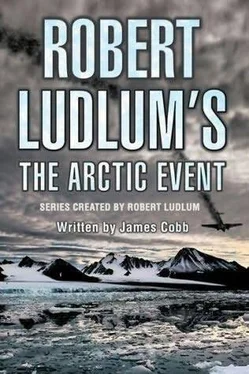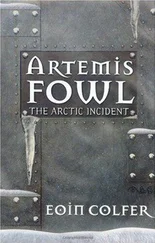Their boots crunched and squeaked on the corn snow of the trail as they moved on to the station.
According to the site map they had been given, the northernmost of the three huts was the storage and utility building, shorter trails radiating out from it to the camp’s flammable coal, gasoline, and kerosene dumps.
Outside the hut’s door there was no need for Smith to give orders or to speak at all. He only took a covering station beside the door. Valentina twisted a knurled knob on the model 70’s Pachmayr optics mounts, tipping the scope aside to clear the rifle’s close-range iron sights, and Randi drew back the bolt on the MP-5. Carrying the “short gun,” she would have the point going in. With Smith and Valentina covering from either side of the snow lock, Randi pushed through the outer and inner doors into the hut.
A moment of silence followed, then, “Clear.”
Smith took his own fast look around inside the unheated building. There was only the camp’s auxiliary gasoline generator and ranked shelves packed with equipment and stores. The reserves were somewhat depleted after a season in the field, but a sizable emergency stock remained. It was an old just-in-case for polar exploration. For a one-season stay, you supplied for two.
The central hut was the combination laboratory and radio shack. A wind turbine mounted on a short, heavily guylined mast purred nearby, pumping out electric power. A second, taller steel girder mast, carrying the communications antenna, stood atop a low ice-covered knoll some hundred yards beyond the camp area.
The last word from Kayla Brown had come from the radio shack.
Again the team repeated the entry drill.
Again, “Clear!”
Rifles lowered, Smith and Valentina followed Randi into the hut. A smoky warmth struck Smith’s face as he pushed through the inner snow lock door. This building still held life. Laboratory implements gleamed untouched on the workbenches and central table. Sample and equipment cases lay on the floor, some closed and secure, ready to load. Others were open and in the process of being filled.
The heat in the cabin issued from a small coal stove centered on the north wall. Crossing to it, Metrace lifted the stove lid, revealing glowing orange ash. “I wonder how long one of these things can hold a fire,” she mused, adding a few chunks of glossy black anthracite from the scuttle.
“Probably for some time,” Smith commented, looking around the lab. “There’s no sign of a struggle, and there are plenty of delicate things in here to smash.”
“Um-hm,” Valentina agreed, pointing toward a row of empty hooks near the exterior doorway. “Miss Brown must have had the chance to put on her snow gear. Apparently she left under controlled circumstances.”
Smith went on into the radio room. With her gloves off and her hood thrown back, Randi was sitting in the sidebands operator’s chair, a frown on her face. The radios were still switched on. Check lights glowed green, and the thin hiss of a carrier wave issued from the speakers. As Smith looked on she pressed the transmit key at the base of the desk mike. “CGAH Haley CGAH Haley, this is KGWI Wednesday Island. This is a check call. This is a check call. Do you copy? Over.”
The carrier hissed back emptily.
“What do you think, Randi?”
“I don’t know.” She shook her head. “We’re on frequency, and the transmitter gain indicates we’re putting out.” She adjusted the receiver squelch and transmitter power and repeated the test call, to no effect. “Either they’re not hearing us or we’re not hearing them.”
There was a sat phone and data link at the far end of the console. Smith stepped around Randi and lifted the receiver, punching in the Haley ’s address code. “No joy here, either,” he reported after a moment. “It’s not accessing the satellite.”
“Could it be the antennas?”
“Possibly. That’ll be something to check out later. Let’s go.”
The last hut in the row was the bunk room. The leading edge of the snow squall had enveloped the station, and visibility was graying out as the team approached the building.
Once more they repeated the entry drill. Flanking the snow lock door, Smith and Metrace listened as Randi pushed her way into the bunk room. After a moment, they heard her exclaim aloud, “Now, this is just too weird!”
Smith and the historian looked at each other and shouldered through the lock into the bunk room.
Inside, the overall layout was similar to the laboratory. There were two sets of bunk beds and a small coal heater against the north wall of the cabin. Kitchen equipment and a food preparation counter were on the south, with a communal mess table in its center. A set of women’s quarters had been partitioned in the far end of the hut, an accordion-style sliding door standing half open.
The bunk room had been heavily personalized with a variety of photographs, hard-copy downloads, and sketches, humorous and otherwise, tacked and taped to the walls.
Randi was standing beside the mess table, staring down at a plate holding a half-consumed corned beef sandwich and a half-empty glass of tea.
“I concur, Miss Russell,” Valentina Metrace said, joining in the stare at the sandwich. “That is indeed the limit.”
Randi set her submachine gun on the table. “I feel like I’ve just gone aboard the Mary Celeste. ” She tugged off one of her leather inner gloves and touched a couple of fingers to the side of the glass. “Still warm,” she commented.
Looking up, she tapped the rim of the glass with a fingernail.
Jon Smith knew that he truly had a team working at that moment. None of the three in the bunk room had to say a word to understand her meaning.
The portable SINCGARS transceiver squalled and shrieked, with only the faintest fragmentary hint of human speech discernible through the clamor of the disintegrating Heaviside layer. Even with the extended-range eighteen-foot antenna strung in the rafters of the laboratory hut, it was futility.
Smith snapped off the radio. “I think the Haley might be receiving us and I think they might be trying to acknowledge our call, but I wouldn’t count on anything beyond that.”
“It’s the same with the set in the Ranger,” Randi added. “While we’re on the ground it doesn’t have enough power to punch through the solar interference. We might have more luck with the big station SSB, but I still can’t figure out what’s wrong with it.”
With their gear unloaded and the helicopter tarped and tied down against the weather, the landing party from the Haley had gathered in the laboratory hut, both to make a futile attempt to contact their mother ship and to develop a course of action.
“What do we do now, Colonel?” Smyslov inquired.
“We do what we came here to do: get a look at the crash site.” Smith glanced out of the lab window. The snow had slackened for the moment, but the wind still gusted uneasily. “We’ve got enough daylight left to reach the saddleback. Major, Val, you’re with me. Get your gear together and plan for a night on the ice. Doctor Trowbridge, as you’ve stated, this station is your responsibility. I think it’s best you stay here. Randi, if you could step outside with me for a moment. I need to talk with you.”
Garbing up, they pushed out through the snow lock, making the transition from the enclosed warmth of the hut to the piercing cold of the outdoors. Smith led Randi up the packed snow trail between the cabins until there was no chance of being overheard.
“All right,” he said, turning to her. “We have a problem.”
Randi produced a wry ChapSticked smile. “Another one?”
“You might think so,” Smith replied, the mist of his breath swirling around his face. “Here’s the situation. I’m going to have to do something I don’t want to do. I have to split my forces, such as they are, to cover both the station and the bomber. I’m going to need both Professor Metrace and Major Smyslov with me at the crash site. That means I’m going to have to leave you here on your own. I don’t like it, but I’m stuck with it.”
Читать дальше












